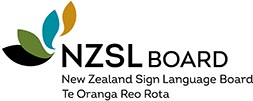Report on NZSL Interpreter Standards released
- NZSL video: Announcement of the release of the NZSL Interpreter Standards Report
- NZSL video: Executive Summary - A Review of NZSL Interpreter Standards Report
The NZSL Board was set up in 2015. It was agreed that an important issue the NZSL Board had to focus on was a review of the NZSL interpreter services across New Zealand. The Deaf community and interpreters have for a long time stated that there is a need to set up a national NZSL interpreters’ standards system to ensure the Deaf community has access to high quality NZSL interpreting services. There is also a concern in the Deaf community about a limited supply of NZSL interpreters across New Zealand.
Fitzgerald and Associates were contracted in June 2016 to provide an up-to-date status report on NZSL interpreting in New Zealand, and put forward recommendations on the development of interpreter standards. Sign Language Interpreting Association of New Zealand (SLIANZ) was also contracted as the Lead Partner on this project. SLIANZ worked closely with Fitzgerald and Associates and the Office for Disability Issues, providing subject matter expertise and contributing to the content of the final report.
The NZSL Board requested information on:
- the current NZSL interpreter situation in New Zealand
- the issues experienced by the Deaf community and NZSL interpreters
- overseas sign language interpreter standards systems
- options for the development of a NZSL interpreter standards system in New Zealand.
What did the review find?
The key findings of the review, which are not the final view of the NZSL Board, are:
- The NZSL interpreting services in New Zealand has many strengths that can be built upon to improve the quality of interpreting to Deaf people.
- The NZSL interpreter work force is a mature workforce, with a good degree course qualification.
- The variability of skills, qualifications and experience within the work force, however, indicates that work on interpreter standards would be helpful in improving consistency of interpreter quality for Deaf people.
- Given the level of interpreting services available, areas like Auckland, Wellington and Christchurch have a high level, while other regions and smaller towns have relatively little access.
- There is a dilemma in that Deaf people are concerned that interpreters are not as available as Deaf people would like while interpreters, at the same time, are concerned that they do not have enough interpreting work.
- The professional interpreter association, SLIANZ, provides voluntary resources, some mentoring options, professional development, a directory of members, and support for its active membership.
- The current supports available are not sufficient to guarantee the quality of service required by Deaf people. The review found that NZSL interpreter services are considered by the Deaf community, overall, to be of moderate quality and highly variable.
- The review found overwhelming support in both the Deaf community and among interpreters for the establishment of a NZSL interpreters’ standards system which should include, at a minimum, a registry that certifies, lists, validates and assesses NZSL interpreters.
- The review considered four overseas interpreter standard systems. It presented options that need to be considered when designing a NZSL interpreter standards system that could successfully operate in New Zealand.
What is going to happen next?
The report confirmed that there is an overwhelming need and support in both the Deaf community and among interpreters for a NZSL interpreter standards system to be established in New Zealand. The report provided the NZSL Board with a wide range of information which needs to be considered when moving to the next stage, that is, the design of a NZSL interpreter standards system in New Zealand.
The NZSL Board is now seeking advice on the design of a NZSL interpreter standards system, including the best way for the system to operate in New Zealand and the cost of establishing and maintaining the system. This advice will be provided through a feasibility study carried out by Fitzgerald and Associates. Tricia Fitzgerald said she was delighted to be back designing some options for the future interpreter registry and its core components. Interpreters will be consulted on their views.
A report will be completed by September 2017. The NZSL Board will consider this report at its meeting towards the end of September 2017. The Office for Disability Issues will provide further information on the results of this work by the end of 2017.
Relevant links:
- Download 'A review of NZSL Interpreter Standards Report' [PDF, 1.5 MB]
- NZSL Board Action Plan 2016-2018, Action 5A: Develop interpreter standards
NZSL video: Executive Summary - A Review of NZSL Interpreter Standards Report
Page last updated:
